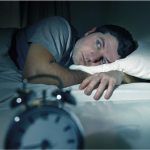Sleep is a superpower. Why? Because good, restful sleep on a regular basis is associated with better metabolic health, cognitive function, and longevity.
Indeed, as celebrated author, physician and podcaster Dr. Michael Mosley says, if there is that one thing you need to add to your routine, it is to go to bed early. The people who go to bed late often spend their time browsing the internet or watching TV. This often adds to the stress they may already be experiencing due to work or family issues. Increased stress levels can lead to hormones such as adrenaline and cortisol, which can prevent sleep initiation, and also increase the risk of obesity, high blood pressure, and diabetes. Stress also increases calorie intake worsening weight gain and glucose control.
While, it is not easy to go to bed early, there are some healthy tips that will assist this process. Sleeping in a room that is slightly cooler than other rooms will help. Reducing caffeine intake, limiting mobile screen use and keeping the house lighting dimmer, will all help release sleep hormones and aid a better sleep. Music, reading or other relaxing activities may also help you to sleep early. It is said that milk contains an amino acid called tryptophan which aids sleep. However excess milk at night can add to caloric intake and interfere with diabetes and obesity management. Waking up early in the morning and exposing yourself to bright sunlight can help set your biological clock, helping you go to bed early. In addition, early
morning sunlight is said to release “happy hormones”, and thus elevating your mood in the morning. When we go to sleep, blood is often shunted from the core to the hands and the feet, and then this helps to drop the body temperature. Hence, in addition to sleeping in a cooler room, having a warm water bath will increase the blood flow to the skin, resulting in better sleep.
Well, many people worry over how many hours they should sleep. It was the multitalented genius, Benjamin Franklin, who said that “early to bed and early to rise makes a person healthy, wealthy, and wise.” Franklin himself slept for 7 hours: reportedly went to bed at 10 pm and woke up at 5 am. Recent guidelines agree with this. The well-known Mayo Clinic, USA, for instance recommends that 7 hours of sleep is essential and probably sufficient for adults.
Dear readers, don’t lose sleep over how long to sleep, or your problems or any other stressful matters – just sleep on it! When you sleep at night, your brain consolidates memories, emotions and information, making you better poised to make good decisions in the morning. There are many ways in which we can improve our sleep hygiene, but it is important to select and implement a sleep schedule that is personalised for you. In the cover story of this issue of Diabetes Health, we will help you to rediscover the superpower of your sleep. So that you can prevent another sleepless night and doze your way to health! Happy reading!
Dr Unnikrishnan AG
Editor













